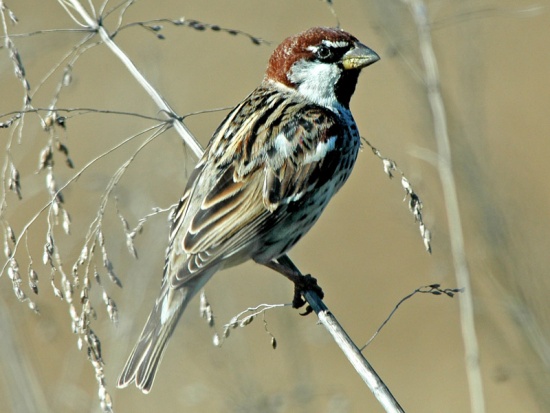m (link to Crete) |
(User & Incomplete templates, Video link & Category. Bird Song Category & References given for copied text) |
||
| Line 1: | Line 1: | ||
| + | {{incomplete}} | ||
| + | [[Image:18568Spanishsparrow01.jpg|thumb|550px|right|Photo by {{user|johnmoonie|johnmoonie}}<br/>Photo taken: Extremadura, [[Spain]]]] | ||
;[[: Category:Passer|Passer]] hispaniolensis | ;[[: Category:Passer|Passer]] hispaniolensis | ||
| − | + | ||
==Identification== | ==Identification== | ||
| − | 15-16cm. Red-brown crown, white cheeks, black back, and underparts heavily streaked with black. The female is almost identical to the [[House Sparrow]], only distinguishable by its slightly heavier build. | + | 15-16cm. Red-brown crown, white cheeks, black back, and underparts heavily streaked with black. The female is almost identical to the [[House Sparrow]], only distinguishable by its slightly heavier build. <sup>[[#References|[1]]]</sup> |
==Distribution== | ==Distribution== | ||
| − | [[Cape Verde]], the [[Canary Islands]], [[Madeira]], northern [[Africa]], western [[Spain]], [[Sardinia]], [[Sicily]], [[Malta]], [[Crete]], the Balkans, and across southwest and central [[Asia]] from [[Turkey]] east to westernmost [[China]]. | + | [[Cape Verde]], the [[Canary Islands]], [[Madeira]], northern [[Africa]], western [[Spain]], [[Sardinia]], [[Sicily]], [[Malta]], [[Crete]], the Balkans, and across southwest and central [[Asia]] from [[Turkey]] east to westernmost [[China]]. <sup>[[#References|[1]]]</sup> |
==Taxonomy== | ==Taxonomy== | ||
==Habitat== | ==Habitat== | ||
| − | Trees near rivers or other wet areas in farmland. | + | Trees near rivers or other wet areas in farmland. <sup>[[#References|[1]]]</sup> |
==Behaviour== | ==Behaviour== | ||
The diet includes seeds. | The diet includes seeds. | ||
| − | 3-8 eggs are laid and incubated for 12 days; the chicks fledge when about 14 days old. | + | 3-8 eggs are laid and incubated for 12 days; the chicks fledge when about 14 days old. <sup>[[#References|[1]]]</sup> |
| − | == | + | |
| + | ====Vocalisation==== | ||
<flashmp3>Passer hispaniolensis (song).mp3</flashmp3><br /> | <flashmp3>Passer hispaniolensis (song).mp3</flashmp3><br /> | ||
''[[Media:Passer hispaniolensis (song).mp3|Listen in an external program]]'' | ''[[Media:Passer hispaniolensis (song).mp3|Listen in an external program]]'' | ||
| + | |||
| + | ==References== | ||
| + | #[http://en.wikipedia.org/wiki/Spanish_Sparrow Wikipedia] | ||
==External Links== | ==External Links== | ||
{{GSearch|Spanish+Sparrow}} | {{GSearch|Spanish+Sparrow}} | ||
| + | <br /> | ||
| + | {{Video|Spanish_Sparrow}} | ||
| + | |||
| − | [[Category:Birds]] [[Category:Passer]][[ | + | [[Category:Birds]] [[Category:Passer]][[Category:Videos]][[Category:Bird Song]] |
Revision as of 21:37, 29 December 2008
| This article is incomplete. This article is missing one or more sections. You can help the BirdForum Opus by expanding it. |
- Passer hispaniolensis
Identification
15-16cm. Red-brown crown, white cheeks, black back, and underparts heavily streaked with black. The female is almost identical to the House Sparrow, only distinguishable by its slightly heavier build. [1]
Distribution
Cape Verde, the Canary Islands, Madeira, northern Africa, western Spain, Sardinia, Sicily, Malta, Crete, the Balkans, and across southwest and central Asia from Turkey east to westernmost China. [1]
Taxonomy
Habitat
Trees near rivers or other wet areas in farmland. [1]
Behaviour
The diet includes seeds.
3-8 eggs are laid and incubated for 12 days; the chicks fledge when about 14 days old. [1]
Vocalisation
<flashmp3>Passer hispaniolensis (song).mp3</flashmp3>
Listen in an external program
References
External Links




